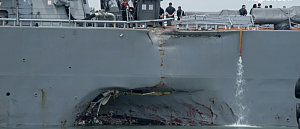Cyberattack in the South China Sea? USS McCain catastrophe raises questions
THE collision of a second US warship this year points to the possibility of cyber espionage, an expert has warned. The US Navy ordered an investigation Monday into its entire 7th Fleet, based in the Pacific, after the USS John S McCain was involved in a run-in with an oil tanker near Singapore.
The incident left a gaping hole in the destroyer’s hull, injured five sailors and left 10 sailors still missing.
It was the second major collision in the last two months involving the 7th Fleet. Seven sailors died in June when the USS Fitzgerald and a container ship collided in waters off Japan.
… and an expert speaks out:
“When you are going through the Strait of Malacca, you can’t tell me that a Navy destroyer doesn’t have a full navigation team going with full lookouts on every wing and extra people on radar,” said Jeff Stutzman, chief intelligence officer at Wapack Labs, a New Boston, New Hampshire, cyber intelligence service.
“There’s something more than just human error going on because there would have been a lot of humans to be checks and balances,” said Stutzman, a former information warfare specialist in the Navy.
He isn’t the only one discussing the possibility of a cyberattack:
Speculation has been building that the USS McCain was hacked ever since news broke about the collision.
Itay Glick, founder of cyber security firm Votiro said he had immediately become interested in the potential for cyber interference when he heard about the accident yesterday.
“I don’t believe in coincidence,” Mr Glick told news.com.au.
“Both USS McCain and USS Fitzgerald were part of the 7th Fleet, there is a relationship between these two events and there may be a connection.”Mr Glick worked in the cyber-warfare unit of the Israeli intelligence agency for seven years and he believes countries like Russia and China may have the capability to launch an attack on the warships.
“China has capabilities, maybe they are trying things, it is possible,” he said.
He believes there are two main ways the warship could have been interfered with, including an attack on its GPS that impacted its navigation, or a malware attack on its computer network that gave it incorrect information which may stopped it from seeing the tanker.Some have dismissed the idea the warship could have been subjected to a GPS spoof as unlikely, because the signal would have to be wide enough to affect dozens, if not hundreds of ships in the region.
But Mr Glick said there had already been evidence of this type of technology being used to set at least 20 ships off track in the Black Sea near Russia, and experts have speculated there is potential for it to be isolated to just one target.
Someone in the West Wing needs to pump The Donald full of ritalin and have several national security experts explain why a top-to-bottom rethink of the nation’s military and civilian cyberinfrastructure is actually a bigger priority than Afghnaistan.

